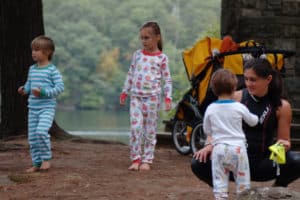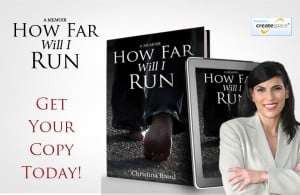Originally published on Trigger Points Anthology on November 29, 2015 By Dawn Daum.
Introducing Trigger Points Contributor Jessica Malionek, author of Fear. My Constant Companion.
1. What was the most surprising thing about becoming a parent?
When my children were infants, it was so easy for me to give myself wholly to their care and to love them unconditionally. I think I was filling them up with the mother I longed for. My love for them was my sustenance and it nurtured me right along with them. The problem, as they got older, was that I couldn’t sustain this self-negating relationship with myself. I was exhausted and resentful and so far from myself which was profoundly confusing because I was working so damn hard to be the best mother I could possibly be. I had to let go of my old beliefs to see that reacting to my mother’s bad mothering didn’t make me a “good” mother. Instead, I had recreated my childhood family-system; sacrificing my needs and my voice for others’ needs. (Which is one of my triggers by-the-way!) As a child, I was told that if I took care of myself I was selfish and bad. I thought that being a loving and attentive mother meant that I had to let go of myself as an individual and give myself over to my children’s care and development completely. I have learned that this couldn’t be further from the truth.
What has surprised me the most about parenting is that I have to deeply and openheartedly care for and love myself first. By doing this, I model being a healthy adult and woman. By caring for and about myself, I teach my children on a fundamental level that they matter. Their voices matter, their opinions matter, their beliefs matter. They just matter! They know this because they see that I feel that way about myself. When I shifted, they shifted and it’s so exciting to see their relationships with themselves and each other changing as I change. It’s been a huge, surprising, gift.
2. Tell us about one of your proudest parenting moments.
Truthfully, every single day. The good days. The bad days. The in between days. Because I have my eyes open and my heart open and I’m so proud of that. I know I don’t have to be perfect, I just have to be real.
3. Was it difficult for you to participate in this project? What strength did you pull from to get past the fear and contribute?
I had no fear about contributing. Which is ironic because my essay is about fear. When the project was mentioned to me I jumped. That’s what I do. I follow my heart and leap first. Usually, when I’m free falling I start looking for the ripcord and parachute. After I’ve done something that makes me feel good and happy and proud I start to second guess and feel self-doubt. So the contributing wasn’t hard. The month before the release was hard. When the release date was given, I started getting nervous and afraid. I felt afraid because I had contributed to something that wasn’t my own. It was a powerless feeling. (Another trigger!) I was a part of something and I didn’t completely know what it was or what it would become. As I saw the unfolding — the book cover, the correspondence between authors and I started feeling a connection to the project and the people who were a part of it, I wasn’t afraid anymore. I was overcome with pride and deep joy. Sometimes when I think about it, I feel like my heart could just burst wide open. There is so much hope in people lifting the blanket of shame together. I’m honored to be a part of it.
4. Do you believe participating in this project has changed you in any way? If so, how?
Absolutely. Through this project I keep seeing that fellow survivors who have shared their stories are some of the most mindful, loving, attentive, honest and real parents out there. They are willing to dig through their own pain and examine themselves over and over again instead of ignoring or disowning the past because they love their children. I think initially all of this work, risking and bravery comes from a place of unconditional love for our children. Our children make us brave. When it gets hard we work harder. We reach out. We ask for help. We believe that we can be more than any suffering we endured, because we have already survived the worst. Now we get to create our own futures. Seeing other survivors embrace their future makes me feel empowered and helps me to continue my own work.
5. What is the greatest lesson you have learned from your children?
You will stand up when you are ready to stand. You will walk when you are ready to walk. You will run when you are ready to run. You will talk when you are ready to talk. I can support, love and encourage with all of my might, but we do things when we are ready, when we are capable and when we feel safe enough to try. And, when you’re learning to ride a bike, you’ll fall down. You will. But then you’ll get back on and give it another go. We are all imperfect and that’s not just okay, it’s a good thing.
6. When you are not writing or parenting, what do you love to do?
I train for Ironman triathlons. Although sometimes that’s more about showing up than loving it; I do love to race! The training takes work, time and sacrifice but I think most things in life that matter to us do.
“When my now nine-year-old son was three years old he would refuse to go to his room for a timeout. I would wail, “How do I get my child to listen to me?” “How do I get him to do what I want him to do if he doesn’t want to?” I wondered — Is it okay for me to make him do what I want him to do or is that a breach of trust and boundaries? Do I need to honor his experience and accept that he doesn’t want to listen to me? What is right? What is the answer? Fear drained me, leaving me in a pile on the floor with my son sobbing. Two frightened, motherless children in a heap of fear and confusion.”
Fear. My Constant Companion.
Jessica Malionek
Trigger Points: Childhood Abuse Survivors of Experiences of Parenting
Bio:
Jessica Malionek is a wife, mother of three, friend, Ironman triathlete, and of late, a slayer of demons — leaping into life and letting go of unhealthy belief systems and inauthentic thoughts about herself. Jessica is a survivor of childhood sexual abuse; through her writing and blog, she’s learning to let go of shame and fear. Jessica has her Master’s of Fine Arts in Clinical Psychology from Antioch University of Southern California. She’s learning to be seen. She hopes that her work and daily living will inspire others to be brave and to embrace their true, authentic selves.
Website: http://thecounterstool.me
Facebook: www.facebook.com/thecounterstool
Twitter: @TheCounterStool
Instagram: The Counter Stool







